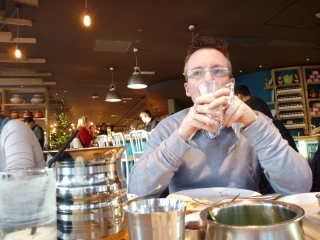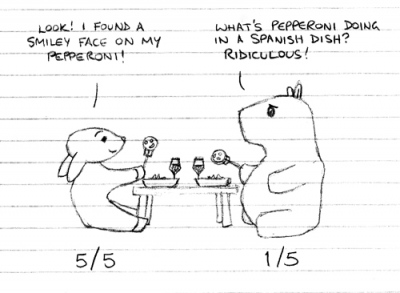On one level, TripAdvisor is a useful tool that has made the world a smaller and easier place to travel around. “Proper” travellers will grumble that it’s taken all the romance and adventure out of a journey to the far side of the world, but they’re welcome to not use it. I like to stay somewhere that other people agree offers clean rooms, friendly service, a sensible price and perhaps is unique or beautiful as a bonus.
But if I’m looking for a place to eat in a strange city? I wouldn’t touch TripAdvisor with a barge pole.
It seems that crowd sourcing works pretty well for identifying good accommodation, but not good dining. This is because people (approximately) agree what is good in a hotel, but tastes and preferences in dining out cover a huge spectrum.
Take The Chilli Pickle. It’s a brilliant restaurant in Brighton serving contemporary Indian cooking; colourful, inventive and singing with spice. It is undoubtedly one of the top five restaurants in the city but comes in a disappointing 28th on TripAdvisor. Checking some of the poor reviews reveals a pattern:
THIS ISN’T INDIAN FOOD! this is the worst Indian meal I’ve had in my life. food is served in a metal tray, metal glasses and jugs…
Gosh, you mean like they do in India? Or how about this gem from another reviewer:
call me old fashioned but when I go for a Indian I like to be served by Indians… the worse thing was not seeing anything on the menu that I recognised apart from the popadoms.
Yes, and when I go for fish and chips I like to be served by a fisherman. The common thread in a whole bunch of reviews is people visiting the Chilli Pickle in the hope of a good ol’ Ruby Murray and being thrown by uncomfortably authentic food.
The opposite problem is worse; very average or truly dire places bubbling to the top of the pile due to the overenthusiastic reviews of those for whom Frankie & Benny’s is the gold standard of deliciousness. I find this a lot travelling, especially in towns without much tourist infrastructure. Most reviews would be from backpackers (I’m inferring) and many times we followed rave reviews squealing about “the bestest meal I’ve ever had ever” or “their pizzas are the best in the world and I eat pizza all the time” only to find ourselves staring at a miserable plate of tourist-oriented crap and wishing we’d chosen a restaurant using the time-honoured principle of go-where-the-locals-are-eating. If this is your idea of the best pizza in the world then I’d suggest that up until now what you’ve actually been eating is pizza boxes.
But of course, I’m a raging foodie and I’d always prefer to sit on a bench in a back alley and eat a bowl of spicy fish-head curry with dubious things floating in it than sit in an air-conditioned tourist trap eating spaghetti bolognese as interpreted by a chef who has only ever seen a photo of it in the Bumper Book of Food Tourists Like. So my own rave review of a little local joint might just as easily lead a hapless family of four from Basingstoke to a horrible dining experience where nothing seems remotely edible. They’d give the place a 1 on TripAdvisor, no question.
And thus TripAdvisor averages everything out and you’re left with no certainty that the Top 10 restaurants in Santiago actually represents anything like the top ten restaurants in Santiago.
One man’s meat is another man’s poison and you only have to read the comments below any online article about any aspect of dining out to discover how polarised people’s views are on what makes a “good” restaurant. The pretentious-and-overpriced-gimme-a-big-plate-of-tasty-food brigade are never going to review in the same way as the happy-to-pay-through-the-nose-for-independent-and-authentic brigade. That’s my brigade, by the way. Correct me if I’m wrong, but people simply don’t get so polarised over hotels. Everyone has their own price-point but beyond that, a comfy room, friendly service, good breakfast and a bit of character seems to be the generally agreed formula for a place to stay.
Personally, I find food guides and blogs to be a much better source of restaurant recommendations. The guides are professional and their editors are going to be taking account of the style of food, the price bracket, and putting the restaurant into context against hundreds of others. The food blogger is only writing a food blog because he or she has a genuine interest and passion for food, so no matter which brigade they’re in I’m going to be willing to trust their opinion. Certainly a lot more than the averaged-out opinion of a whole crowd of individuals who may be giving a bitter 1 because some clerical oversight meant that their booking couldn’t be honoured, or giving an over-rated 5 because they all had a great and tipsy night out on gran’s birthday.




13 pings
Skip to comment form ↓